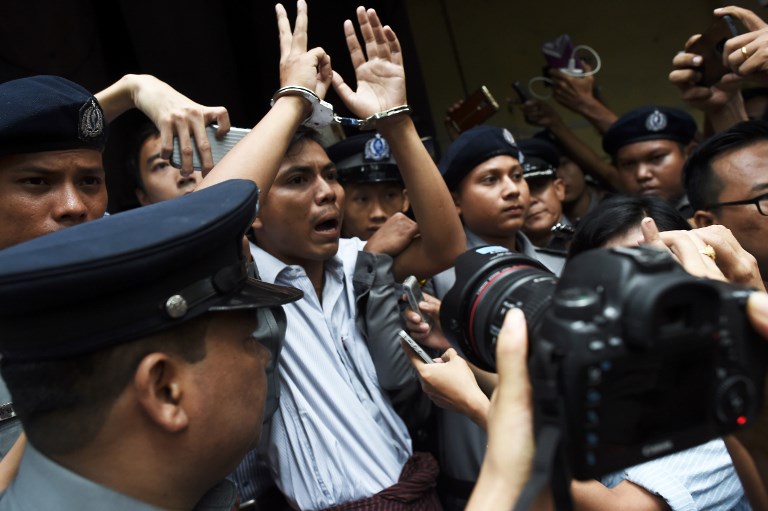A Yangon judge has sentenced two Reuters reporters to seven years each with hard labor for violating Myanmar’s Official Secrets Act, sparking international condemnation of Myanmar’s legal system and restrictions on press freedoms.
Reporters Wa Lone and Kyaw Soe Oo were arrested in December while working on a story that would eventually expose the massacre of 10 Rohingya men and boys in the northern Rakhine State village of Inn Din, during military operations that UN investigators have described as genocide. The Myanmar government has insisted that the case has nothing to do with their reporting and that the reporters are only accused of possessing state secrets.
“They tried many times to get their hands on secret documents and pass them to others. They did not behave like normal journalists,” said Judge Ye Lwin just before he handed down the verdict. When he announced the reporters’ sentences moments later, sobs erupted from the supporters and relatives gathered in the cramped Insein Township courtroom.
“I have no fear. I believe in justice in democracy,” Wa Lone proclaimed as he was led out of the room by police. Kyaw Soe Oo immediately embraced his wife, who wept loudly, and kissed her until police forced him from the room.
The reporters were quickly led into a police truck, which journalists and other supporters tried to block before it eventually left the courthouse grounds and sped off to Insein Prison. The reporters’ nine months in prison during the trial will be included in their seven-year sentences.
After they were sentenced to 7 years each with hard labor, Kyaw Soe Oo immediately embraced his sobbing wife and kissed her.
Wa Lone said: “I have no fear. I believe in justice and democracy.”
Supporters tried to block the truck that took them back to prison. pic.twitter.com/SeV5tzU0ic
— Jacob Goldberg (@yayqe) September 3, 2018
“Today’s verdict is very disappointing. It’s bad for our country, Myanmar. It’s bad for democracy. It’s bad for the rule of law, and it’s bad for the freedom of expression. We’re very disappointed,” said defense lawyer Khin Maung Zaw. “Nobody benefits from this decision, only those dark forces who are against democracy and freedom of expression. We will take any option to get their immediate release.”
Speaking to reporters outside the courthouse, US ambassador to Myanmar Scot Marciel said: “It’s sad, obviously, for Wa Lone and Kyaw Soe Oo and for their families and for all the people of Myanmar who’ve worked so hard to promote fundamental freedoms, including media freedom, and I think others will be asking whether this outcome enhances the confidence that Myanmar people have in their justice system.”
Reuters Asia editor Kevin Krolicki said the company would “explore every avenue” in continuing to push for the reporters’ release. These avenues include appealing to higher courts, as well as lobbying for an intervention from Myanmar’s civilian government, which has the power to grant amnesty.
Krolicki said: “We’ve respected the legal process. We’ve made our case, and we’ve established by any impartial standard, by any fair standard, that they are innocent men. That makes today’s verdict an injustice. So, the government of Myanmar now has a responsibility to set this right.”


